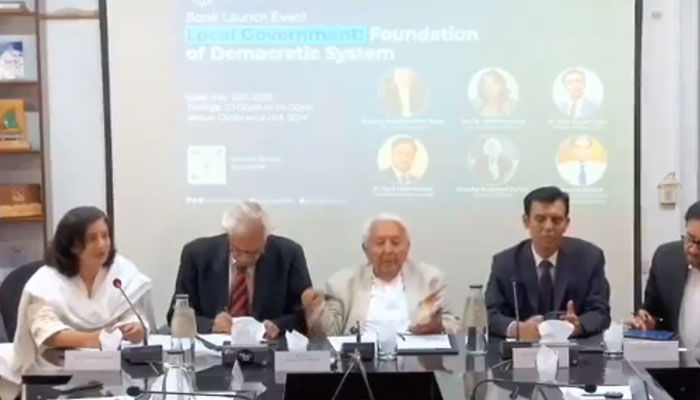Book championing local govts as pillar of democracy launched
Islamabad:A powerful call for decentralisation and grassroots empowerment echoed at the Sustainable Development Policy Institute (SDPI) as it launched ‘Local Government: Foundation of Democratic System,’ a compelling book authored by Barrister Naseem Ahmed Bajwa.
The event brought together policymakers, academics, civil society leaders, and legal experts who unanimously emphasized that without functional and empowered local governments, Pakistan’s democratic dream remains incomplete.
Dr. Abid Qaiyum Suleri, Executive Director of SDPI, opened the discussion by stressing that sustainable development and economic resilience are only achievable through a robust local government system. “In the ongoing budget season, the absence of a Provincial Finance Commission (PFC) is a glaring issue. Without it, equitable distribution of resources remains a fantasy,” he said, underscoring that centralized control is a threat to inclusive progress.
Barrister Naseem Ahmed Bajwa, the author and guest of honour, described the book as a tribute to the silenced voices of 250 million citizens lacking representation at the grassroots level. “Europe’s development isn’t a miracle—it’s the power of strong local governance,” he declared. Citing Article 140-A and 32 of the Constitution, Bajwa labeled the current governance structure “unconstitutional” for failing to operationalize local government systems.
Prof. Dr. Humera Ashfaq, progressive poet and highlighted the historical instability of local governments in Pakistan but stressed their role in enabling development, inclusion, and conflict resolution. “Engaging local leadership is vital to reducing insurgency and alienation,” she said.
Syed Kaleem Imam, former Inspector General of Police and National Coordinator of UNAIDS, drew global comparisons. “Germany and Japan thrived in crisis response due to active local governance. Haiti and Iraq, with centralized systems, did not.” He also pointed out that Islamabad, the federal capital, ironically lacks a local government structure, calling for immediate corrective measures.
Muzzafar Mahmood Qureshi, a former civil servant, praised the book’s accessible style and comprehensive scope. He lamented the erosion of civic structures like mohalla committees and urged for a revival of civil society and meaningful women’s participation, recalling the now-defunct 33% representation benchmark.
Former Election Commission Secretary Kunwar Dilshad criticized provincial governments for sabotaging local polls, especially in Punjab and Islamabad. “The most effective local governance model is in Indonesia, inspired by Pakistan’s own 1959 basic democracy system,” he said. He urged the Election Commission to issue a fresh schedule for local body elections.
In a passionate Q&A session, Bajwa revealed that despite contacting 1,000 former local government representatives, only three responded to his call for reform in negative. “Political elites resist change for fear of losing control over the spoils of power,” he asserted.
-
 PayPal Data Breach Exposed Sensitive User Data For Six-month Period; What You Need To Know
PayPal Data Breach Exposed Sensitive User Data For Six-month Period; What You Need To Know -
 Prince William Receives First Heartbreaking News After Andrew Arrest
Prince William Receives First Heartbreaking News After Andrew Arrest -
 11-year-old Allegedly Kills Father Over Confiscated Nintendo Switch
11-year-old Allegedly Kills Father Over Confiscated Nintendo Switch -
 Jacob Elordi Talks About Filming Steamy Scenes With Margot Robbie In 'Wuthering Heights'
Jacob Elordi Talks About Filming Steamy Scenes With Margot Robbie In 'Wuthering Heights' -
 Why Prince Harry Really Wants To Reconcile With King Charles, Prince William, Kate Middleton?
Why Prince Harry Really Wants To Reconcile With King Charles, Prince William, Kate Middleton? -
 'Grief Is Cruel': Kelly Osbourne Offers Glimpse Into Hidden Pain Over Rockstar Father Ozzy Death
'Grief Is Cruel': Kelly Osbourne Offers Glimpse Into Hidden Pain Over Rockstar Father Ozzy Death -
 Timothée Chalamet Reveals Rare Impact Of Not Attending Acting School On Career
Timothée Chalamet Reveals Rare Impact Of Not Attending Acting School On Career -
 Liza Minnelli Gets Candid About Her Struggles With Substance Abuse Post Death Of Mum Judy Garland
Liza Minnelli Gets Candid About Her Struggles With Substance Abuse Post Death Of Mum Judy Garland -
 'Saturday Night Live' Star Will Forte Reveals How He Feels About Returning To The Show After 2010 Exit
'Saturday Night Live' Star Will Forte Reveals How He Feels About Returning To The Show After 2010 Exit -
 Police Officer Arrested Over Alleged Assault Hours After Oath-taking
Police Officer Arrested Over Alleged Assault Hours After Oath-taking -
 Maxwell Seeks To Block Further Release Of Epstein Files, Calls Law ‘unconstitutional’
Maxwell Seeks To Block Further Release Of Epstein Files, Calls Law ‘unconstitutional’ -
 Prince William Issues 'ultimatum' To Queen Camilla As Monarchy Is In 'delicate Phase'
Prince William Issues 'ultimatum' To Queen Camilla As Monarchy Is In 'delicate Phase' -
 Winter Olympics 2026: Remembering The Most Unforgettable, Heartwarming Stories
Winter Olympics 2026: Remembering The Most Unforgettable, Heartwarming Stories -
 King Charles Hands All Of Andrew Mountbatten-Windsor’s Records And Files To Police: Report
King Charles Hands All Of Andrew Mountbatten-Windsor’s Records And Files To Police: Report -
 Eric Dane's Family Shares Heartbreaking Statement After His Death
Eric Dane's Family Shares Heartbreaking Statement After His Death -
 Samsung Brings Perplexity AI To Galaxy S26 With ‘Hey Plex’ Voice Command
Samsung Brings Perplexity AI To Galaxy S26 With ‘Hey Plex’ Voice Command




